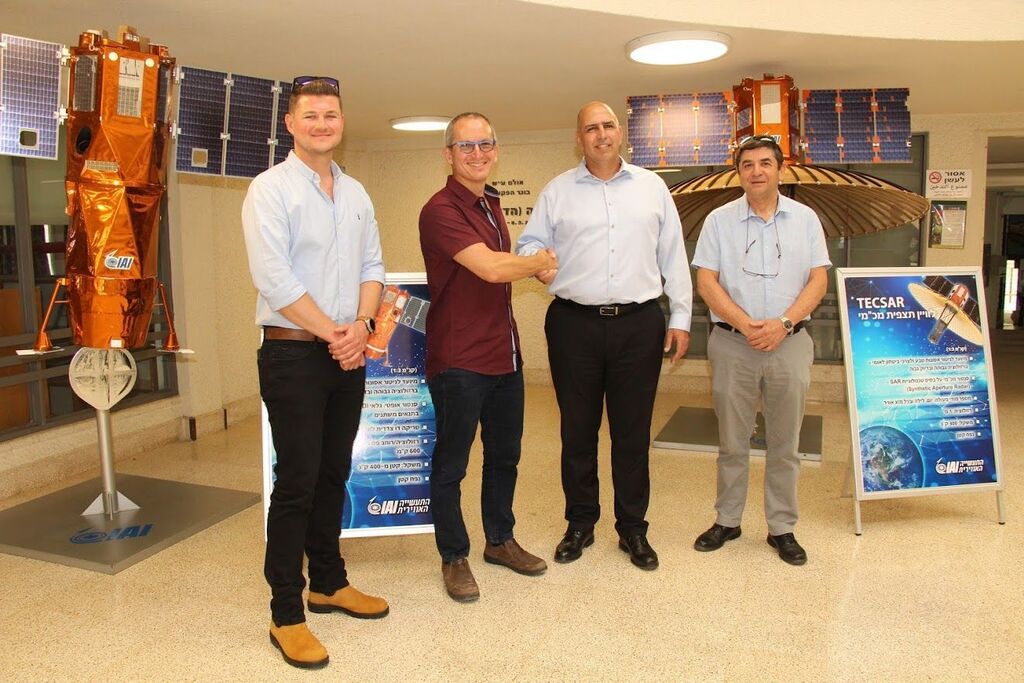The faculty of Aerospace Engineering at the Technion signed a cooperation agreement with the Space Division of Israel Aerospace Industries (IAI) to develop and launch a nano-satellite that will enter low-altitude orbit around the moon, and collect data using a payload of scientific instruments. The project will be performed by the faculty’s students and will start at the beginning of the next academic year, in October 2021. The project is expected to continue until it reaches completion in a few years.
IAI’s Space Division will assist the project in several ways including assigning space engineers to help with defining and characterizing the project and mentoring the students. Participating students will also be provided with tours to IAI’s space laboratories and facilities, where satellites undergo experiments in an environment simulating outer space. By the end of the process, the students will be partners in launching the nano-satellite.
 Right to left: Prof. Gil Yudilevitch, VP and GM of IAI’s Space Division, Shlomi Sudri, Prof. Tal Shima, and Niko Adamsky. Photography: Mark Goldman, Technion communications office
Right to left: Prof. Gil Yudilevitch, VP and GM of IAI’s Space Division, Shlomi Sudri, Prof. Tal Shima, and Niko Adamsky. Photography: Mark Goldman, Technion communications office
The joint project signifies the culmination of a faculty-wide process striving to balance two fields: Aeronautics and Astronautics. Faculty Dean Prof. Tal Shima said, “while in the past only about 10% of our teaching syllabus was dedicated to astronautics, over the past few years there has been an effort to change this and reach a better balance between the two fields. To achieve this we updated our teaching curriculum and we are currently hiring new staff members with related expertise. Cooperation with IAI’s space division will allow us to expose students to additional related projects. This is a fascinating field where activity in Israel and the world is stepping up and I hope to see as many students as possible focusing on it”.
Prof. Gil Yudilevitch, who initiated and leads the cooperation on the faculty’s side, said, “the project will allow students to become partners in a project with the industry and help them reach the end of their studies prepared to be integrated into Israel’s developing space industry”. On IAI’s side, the faculty alumnus Niko Adamsky, who today serves as a space engineer in the IAI’s Space Division, will head the project.
Shlomi Sudri, VP and GM of IAI’s Space Division said during the signing ceremony that “IAI is leading a process to strengthen cooperation with the Technion through a project for students in the field of nano-satellites. This will open a whole new world for them, a world that includes innovative system design. They will be able to gain experience in engineering a unique system in the field of space exploration. The dimension of space necessitates engineering and system capabilities with specialized knowledge. For the students, this is an opportunity to integrate into the field of space in Israel, to be exposed to the wide industry working on outer space, and to get a taste of the engineering and infrastructure capabilities that exist in IAI.”
The agreement was signed shortly after a delegation of senior IAI officials, headed by President and CEO of IAI, Boaz Levy, who is an alumnus of the faculty of Aerospace Engineering, visited the Technion and met with Technion President Prof. Uri Sivan and the Deputy President of Research, Prof. Kobi Rubinstein. IAI’s delegation also included Guy Bar-Lev, Interim Director of the Systems, Missiles and Space Division, and VP and GM of IAI’s Space Division, Shlomi Sudri.
Technion President Prof. Uri Sivan said, “the connection between the industry and academia is important and fruitful for both sides and connecting with a significant and large entity such as IAI is an important step. The interface between academia and industry is changing fast and the Technion is investing great efforts in being established in Israel and internationally. We are working to promote close research cooperation and turn the Technion into a hub for many diverse industries, a platform where industry and academia meet. We are quickly working to commercialize technologies that originated on campus. The last year has been a record year in establishing startup companies in the Technion. Another expression of the strengthening ties comes in establishing specialized routes for learning and vocational training for people in the industry who are interested in lifelong learning”.
IAI President and CEO, Boaz Levy said, “As an alumnus of the Technion, accompanying projects and different mentoring programs over the years, I am excited by the existing and future cooperation between IAI and the Technion. We must strengthen cooperation with the Technion and Aeronautical Engineering and Space faculty, which is unique to its kind in Israel, and hold a leadership position among similar faculties worldwide. Increasing our cooperation with the Technion produces added value to both sides and will help us strengthen and integrate into creating groundbreaking, challenging, and leading technology in Israel and abroad. To this end, it is important we formulate together the image of the engineer we envision – an involved engineer with system-wide perspective and deep business understanding and research capabilities”.
For additional details: Doron Shacham, Technion Spokeswoman, 050-3109088









